Negation(正说反译、反说正译)
第三章 第六节(反译法)

• 5.The window refuses to open.
• 窗户打不开。
• 6.This would cover my absence from the base. • 这就为我不在基地提供了合法解释。
• 7.Children were excluded from getting in the building.
• 11. Mr. Rumsfeld said the Soviet Union was unprecedentedly engaged in a missile-building program.
• 拉姆斯菲尔德说,苏联正在以空前的规模 推行制造导弹的计划。
• 12.The doubt was still unsolved after his repeated explanation. • 虽然他一再解释,疑团仍然存在.
• 17.Don’t make your conclusion before the end of the year. • 到年底再下结论。
• 18.He returned home with no hope on his face. • 他满脸灰心绝望地回到了家。
C. Affirmation--Negation
• 反饥饿游行
• 反恐战争
• 防尘罩
• 抗拉扯实验
• 从广义上说,任何反说转正说和正 说转反说以及任何相反概念的转译 都属于这种译法。
• 这里讨论的主要指带有否定词的正反翻译。
• 英语中含有no,not,never,none,un-,less,im-,in-,ir-等成分的词句,都被 视为否定表达,简称反说。 • 相反,英语中不含这些成分的词句称为肯定 说法,简称正说。
Negation (正说反译、反说正译)
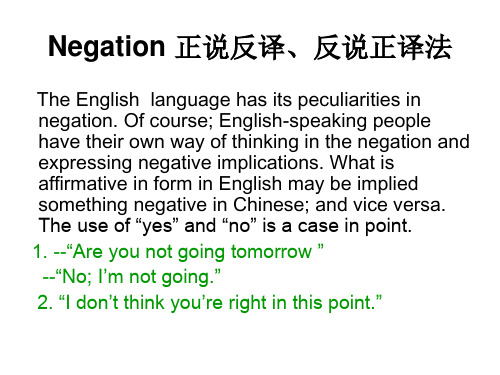
13. Jim was no end upset because he couldn’t go swimming. 吉姆非常心烦;因为他不能去游泳..短语
14. If it worked once; it can work twice. 一次得手;再次不愁..句子
15. Let bygones be bygones. 既往不咎..句子
5. We may safely say so. 我们这样说万无一失..副词
6. The explanation is pretty thin. 这个解释相当不充分..形容词
7. His refusal is not final. 他的拒绝并非不可改变..形容词
8. He was an indecisive sort of person and always
Leave me alone Go away 别烦我走开
Feel at home. 别见外;别客气.. I went to the airport to meet my friend but
missed her. 我去机场接朋友;可是没接着.. Good winner; good loser. 胜不骄;败不馁..
6. The computer is beyond repair. You might as well buy a new one. 这台电脑修不好了;你不如买台新的算了..
7. Women who do house work by the hour may make nearly as much as public school teachers; if they work the same number of hours. 做家务的钟点女工在同样的时间内;其收入同公立学 校的教师的工资差不多.. 做家务的钟点女工在同样的时间内;挣钱不比公立学 校的教师少..
第九讲 正译与反译(negation)

从广义上说,任何反说转正说 和正说转反说以及任何相反概念 的转译都属于这种译法。如 hunger march----反饥饿游行, terror war-----反恐战争,dust mask---防尘罩,tear test----抗拉扯 实验, the head of the story---故事 的后面等都属于广义的正反译法。
• 5.短语 • 1)Don’t lose time in posting this letter. • 赶快把这封信寄出去。 • 2)The examination left no doubt that the patient had died of cancer. • 调查的结果清清楚楚说明病人死于癌症。 • 3)Students, with no exception, are to hand in their papers this afternoon. • 今天下午学生统统要交书面作业。 • 6.句子 • 1)Such fights couldn’t long escape notice. • 这类飞行迟早要会被人发觉的。 • 2)Ashurst saw at once that Phil was not all right. • 艾舍斯特马上看到菲尓出了毛病。
• • • • • • •
4.前置词 1)This problem is above me. 这问题我不懂。(或:我解决不了)。 2)ห้องสมุดไป่ตู้t was beyond his power to sign such a contract. 他无权签订这种合同。 6.名词 1)By about six-thirty the sounds of aircraft, trucks and tanks had become quite familiar, but a series of small explosions nearby seemed cause for new anxiety. • 大约到六点半,大家对飞机、卡车和坦克的声音 已经很习以为常了。但是附近一些轻微的爆炸声似 乎又造成了新的不安。
与翻译有关的那些--反译法

The window refuses to open. 窗户打不开。
正说反译法(动词)
She was refused admittance by them. 他们不许她进去。 Permission to enter was denied. 不准入内。 I was denied the chance of going to university. 我没有得到上大学的机会。
Her abstraction was not because of the tea party. • 她那心不在焉的神情,并不是因为茶话会。
His hesitation led to his failure. • 他不果断/犹豫不决导致了他的失败。
正说反译法(虚词:介词)
To do this is beyond my ability. 干这事我力不胜任。 It was beyond his power to do so. 他无权这样做。
正说反译法(虚词:连词)
The soldiers would fight to death before they surrender. 战士们宁可战斗到死,而决不投降。
I will not go unless I hear from him. 如果他不通知我,我就不去。
正说反译法(虚词:连词)
What you’ve said is above me. 你所说的我不懂。
正说反译法(虚词:介词)
It seems against nature. 这似乎不符合自然规律。
He is above meanness and deceit. 他不至于做卑鄙和欺骗人的事情。
正反译法-negation(课件)

• 不是两种物质都溶于水。
4. 形式否定
否定词与其他词连用形成一种固定结构,其形式上是 否定的,但语义上表示对事物的否定达到极端程度, 接近于否定的否定,实际上是肯定的意思。常见的 有”nothing like(没有什么比得上…), cannot…too(越……越好,再...也不过分)”,。 “cannot…too”的结构可以有变体,如 cannot可 改为 be impossible, not可用 scarcely, hardly, never等代替。
along with the scheme.
• 她可能是最不同意这项计划的人。 • 2)That’s the last thing I’d expect
you to do.
• 那是我最不愿意你去做的事情。
• 7. 表示否定的特殊表达结构 • More than • 1)The beauty of this city is more
创造,也没有能量能被消灭。
• (正)能量转换的实验说明能量既不能
创造,也不能消灭。
3. 部分否定
• 部分否定主要由all, every, both, always等含
全体意义的词与否定词构成,这类否定句中的否 定词not有时与谓语在一起,构成谓语否定。形 式上很像全部否定,但实际上是部分否定。在这 种部分否定句中,因词序与汉语很不相同,汉译 时稍一不慎就会造成差错,这类句子中不论 not 在什么地方,通常都译为“不全是”、“不总 是”、“并非都”、“未必都”等。
• 再困难的任务,我们也能完成。
• 6. 含蓄否定
• 英语里有些词或词组形式上是肯定的,但意义往往 是否定的,由这类词或词组表达的否定称为含蓄否 定或意义否定。汉译时,一定要把否定的意义明确 译出。
正说反译-反说正译
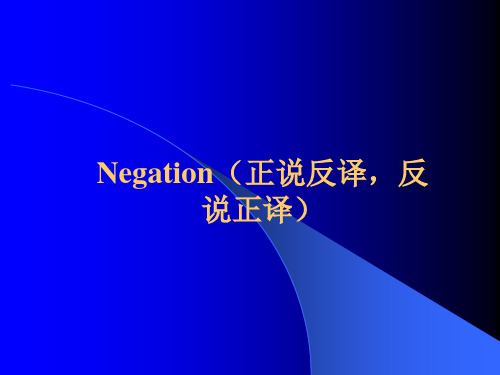
1. Unless something is moved,no work is done. 译文:除非某种东西被移动,否则功不会被完 被 被 成。 2. Only objects struck by the light are visible. 译文:只有被光明照到的东西才能被看见。 被 被 上两句一定要用“被”字吗? 改译:1. 除非某种物体发生了 发生了移动,否则就没 发生了 没 有功。 2. 光照射到的物体是可见的 是可见的。 是可见的
(1) After you, sir. 先生,您先请。 (2) The worst of the problem is behind us. 这问题最坏的情况已经过去了。 3)The darkness was thinning, but the street was still dimly lighted. 天渐渐有些亮了,然而街上还亮着暗淡的灯光。 4)…… he drove slowly down the hill, his elbows resting on the wheel, his chin cupped in his hands. 他慢慢顺山坡向下开去,两肘支在方向盘上,双 手拖着下巴。
参考译文
(1)他说他对她感激不尽,简直难以表达他的 谢意。 (2)他理应受到表扬,怎么表扬也不过分。 (3)遇到这种不幸事件愈少见邻居愈好。 (4)但愿我们搬得愈远愈好;我现在讨厌这该 死的小镇和这里所有的人。 (5)战争并不因我知道它终究会来就为了迎合 我而来得很快。
(1) All’s not smooth for Lakers. (标题) 湖人队未必一帆风顺。 (2) All that glitters is not gold. 发光的不一定就是金子。 (3) All is not right. 未必全对。 (4) Jordan replied, “Every year is not going to be a great year.” 乔丹回答说:“并不是每年都是顺利的”
英汉翻译(8)正反译法

• Affirmative-negative transformation of connectives • 1) It is before ten yet. • 还不到十点钟。 • 2) Don't come in unless I call you. • 要是我不来叫你,你别来。 • 3) He took two steps and heard, rather than saw, a strange whirring sound coming toward him. • 他走了两步就听见,而不是看见,一个奇怪的呼 啸声冲他而来。 • 4) You cannot succeed unless you work hard. • 你不努力是不会成功的。
• 按照专家们的说法,不用说打仗,就连出海也是 不容许的。
• 4) He tried to catch one of the rafts with a boat hook but missed. • 他努力想用船钩钩住一只竹筏,可是没钩着。 • 5) Your legs are young enough to hold you. • 你的腿还没老得走不动呢。 • 6) These are days when nerves are worn thin. • 这些日子教人吃不消。 • 7) "You'll go in and say good-bye to Miss Pinkerton, Becky!" • "I suppose I must," said Miss Sharp calmly, and much to the wonder of Miss Jemima;... • “贝吉,你要进去跟娉克敦小姐道声别。” • “我想这是免不了的。”夏普小姐不动声色地说,而吉米 小姐直觉诧异。
表达转换译法

24 返回章重点 退出
(三)形容词
(A) He failed his examination because his work was careless and full of mistakes. 译文:他考试不及格,因为他的作业粗枝 大叶,错误百出。 (B) All the articles are untouchable. 译文:所有展品禁止触摸。
19 返回章重点 退出
(七) 短语
(A) The islanders found themselves far away ready to fight the war. 译文:岛民发现自己远远没有做好战 斗准备。 (B) In all my travels I had yet to see a place as beautiful as the West Lake. 译文:我所到之处还未见过像西湖这 样美的地方。
27 返回章重点 退出
(六)多余否定
(A)I’m going back over every foot of the way we came to see if I can not find it 译文:我们打算原路返回,看是否能够 找到它。 (B)What dirty means would the landlord not resort to! 译文:什么卑鄙的手段那个地主都会使 出来!
12 返回章重点 退出
(二) 名词
(A) I hate the lack of privacy in the dormitory. :我嫌在宿舍里没有独处 的机会。
【译文】
13 返回章重点 退出
(B) The three things I have just mentionednt situation, neglect of studying of history and neglect of applying MarxismLeninism—all points to an extreme bad style in work. 【译文】 :上面我说了三个方面的情形,不注 重研究现状,不注重研究历史,不注重马克 思列宁主义的应用,这些都是极坏的作风。
8 negation
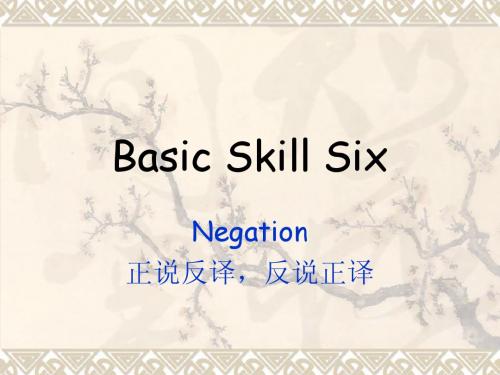
10)If he had kept his temper,the negotiation would probably have been a success 假如他不发脾气,谈判很可能已经成功了 11)I know you hate me and I hate you. We’d better part right now 我知道你嫌我,我也恨你,我们马上分手吧
Reference Answers
1.
2. 3. 4. 5. 6. 7.
我没能说服他,是他相信自己的错误 她简单地说,“他们全都不是好东西”。 要是不更努力些,你是不会成功的 不出所料,敌人果然自投罗网 小心!别碰到我的右臂 把鞋带系上,卢比 欲速则不达
8.
到年底再下结论吧 9. 汤姆对音乐一窍不通 10. 我们对今后的计划一无所知 11. 他的工资总是不够花 12. 祖国不解放,她就不能袖手旁观 13. 格林小姐终日足不出户 14. 间谍们一直在监视我的行踪
7. 短语的反译 1)The islands found themselves far from ready to fight the war 岛民发现自己远远没有做好作战准备 2)We believe that the younger generation will prove worthy of our trust 我们相信年青一代将不会辜负我们的信任
正反译法Negation
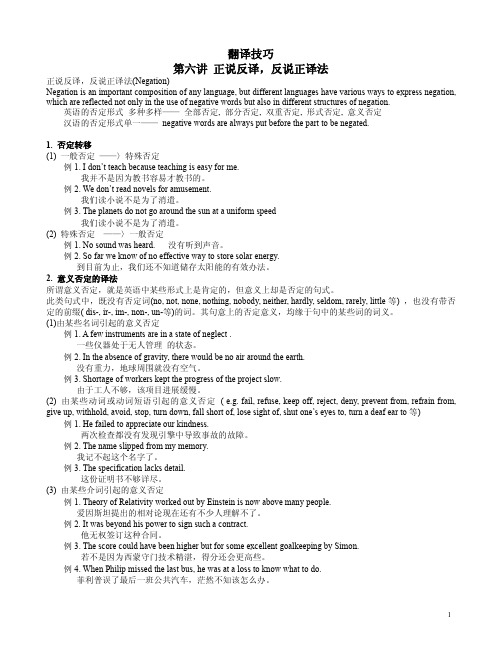
翻译技巧第六讲正说反译,反说正译法正说反译,反说正译法(Negation)Negation is an important composition of any language,but different languages have various ways to express negation, which are reflected not only in the use of negative words but also in different structures of negation.英语的否定形式多种多样——全部否定,部分否定,双重否定,形式否定,意义否定汉语的否定形式单一——negative words are always put before the part to be negated.1.否定转移(1)一般否定——〉特殊否定例1.I don’t teach because teaching is easy for me.我并不是因为教书容易才教书的。
例2.We don’t read novels for amusement.我们读小说不是为了消遣。
例3.The planets do not go around the sun at a uniform speed我们读小说不是为了消遣。
(2)特殊否定——〉一般否定例1.No sound was heard.没有听到声音。
例2.So far we know of no effective way to store solar energy.到目前为止,我们还不知道储存太阳能的有效办法。
2.意义否定的译法所谓意义否定,就是英语中某些形式上是肯定的,但意义上却是否定的句式。
此类句式中,既没有否定词(no,not,none,nothing,nobody,neither,hardly,seldom,rarely,little等),也没有带否定的前缀(dis-,ir-,im-,non-,un-等)的词。
【精选】英汉翻译(9)正反译法26

• 7) I want everybody to have a fair deal. • 我要人人都不要欺诈。
2. A negative statement in English is put into
• 林肯总统被暗杀的消息不径而走。
• 3) The pioneers made light of difficulties and dangers. • 开拓者们轻视困难和种种危险。
• 4) Miss Fairlie kept to her room all day. • 法拉力整天足不出户。
• 5) Haste makes waste. • 欲速则不达。
• "I suppose I must," said Miss Sharp calmly, and much to the wonder of Miss Jemima;...
• “贝吉,你要进去跟娉克敦小姐道声别。” • “我想这是免不了的。”夏普小姐不动声色地说,而吉米
小姐直觉诧异。
• Affirmative-negative transformation of ad。
• 4) He can read fairly easily. • 他阅读没什么困难。
• Affirmative-negative transformation of adjectives
• 1) Pure metals have few useful properties. • 纯金属几乎没什么可取的特性。
an affirmative one in Chinese
翻译-正反、反正法

有许多能源尚未开发 尚未开发。 有许多能源尚未开发。问题始终是要以一合理的代价利用这些 能源。 能源。
He went into the insecure building.
他走进那所危楼。 他走进那所危楼。
Examples
A radar screen is not unlike a television.
雷达荧光屏跟电视荧光屏一样。 雷达荧光屏跟电视荧光屏一样。
Don’t stop working,” he said
Negation & Affirmation
Zhang Xiaowen An Qing Qi Yue Ding Xiaoyu
Iห้องสมุดไป่ตู้troduction
英语和汉语中往往均可用肯定形式或 英语和汉语中往往均可用肯定形式或 否定形式表达同一概念。 否定形式表达同一概念。但由于讲英语国家 的历史、地理、 的历史、地理、社会文化背景和生活习性与 我国不同,因此这些国家人们的思维方式 思维方式与 我国不同,因此这些国家人们的思维方式与 我们有时存在很大差异。 我们有时存在很大差异。这种差别体现在语 言习惯上,便产生了两种语言各自独特的表 言习惯上, 达形式。 表示否定意义时, 达形式。在表示否定意义时,这种差异显得 尤为突出。 尤为突出。英语的否定表达是一个常见而又 比较复杂的问题。有的英语句子形式上是否 比较复杂的问题。有的英语句子形式上是否 定的而实质上肯定的,有的形式上是肯定的 定的而实质上肯定的,有的形式上是肯定的 而实质上是否定的。 而实质上是否定的。
翻译常用的八种技巧

翻译常用的八种技巧一、常用的翻译技巧1. 重复法(repetition)2. 增译法(amplification)3. 减译法(omission)4. 词类转移法(conversion)5. 词序调整法(inversion)6. 分译法(division)7. 正说反译, 反说正译法(negation)8. 语态变换法(the change of the voices)1. 重复法汉语重复,英译时也重复;根据两种语言各自的习惯用法,以不同的表达方式进行重复,这种重复通常是为了传达原文的生动性.We have to analyze and solve problems.我们要分析问题,解决问题。
Let’s revise our safety and sanitary regulations.我们来修改安全规则和卫生规则吧。
Gentlemen may cry, peace, peace --- but there is no peace.先生们尽管可以高呼和平,和平!但是依然没有和平。
Nels had it all written out neatly.纳尔斯把它写得清清楚楚。
青青河边草, 郁郁园中柳。
Green grows the grass upon the bank,The willow shoots are long and lank.2. 增译法为了使译文忠实地表达原文的意思与风格并使译文合乎表达习惯,必须增加一些词语,这就叫增译法.增词义增加虚词为多,也可酌量增加实词。
英译汉时经常增加的词有结构词、数量词、概念词、语气词等。
从增补的功能来看,可以分为结构增补、意义增补和修辞增补。
I am looking forward to the holidays.我们等待假日的到来。
Much of our morality is customary.我们大部分的道德观念都有习惯性。
Reading makes a full man; conference a ready man; and writing an exact man.读书使人充实,讨论使人机智,笔记使人精确。
正说反译、反说正译法

精品..
正说反译法(动词)
• Today he failed to get to school on time. • 他今天没有准时到校。 • If the crops fail there will be a serious
food shortage. • 如果谷物收成不好,将会出现严重的粮荒 • The letter failed to arrive. • 信没有送到。 • His secretary failed to tell him about it. • 他的秘书没有告诉他。
• 由于看不到、也不去分析语言问题与非语言问题之 间的相互关系,产生了两大不足
• This failure was the making of him. • 这次不成功是他成功的基础。
• The government’s failure to carry out their election pledge
• 消防队员成功把火势控制在存放不易燃烧物 品的仓库范围内。
• 二十一岁以下的人不he plan failed and for years he lost his political power.
• 计划失败了,他在政治上多年不得志。 • Such a chance was denied me. • 我没有得到这样的机会。 • Ex-Governor Stark remained a private
精品..
正说反译法(形容词)
• Slips are scarcely avoidable when you’re new to your work.
• 工作没有经验,出点差错在所难免。
• A young clerk new to the job • 对工作还不熟悉的年轻办事员
翻译就这七个字
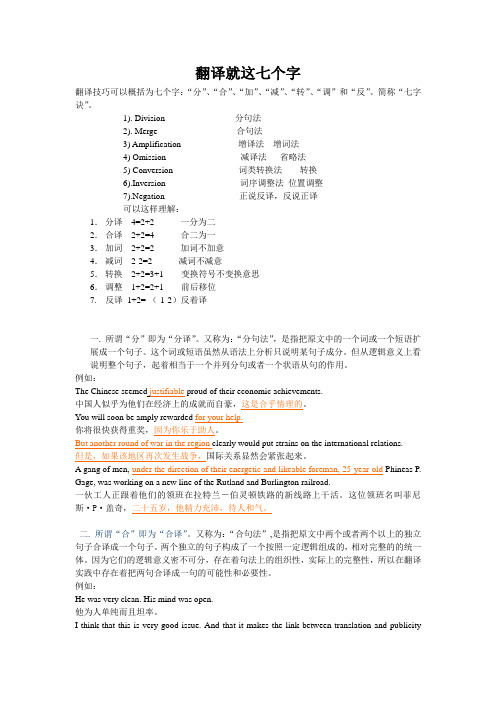
翻译就这七个字翻译技巧可以概括为七个字:“分”、“合”、“加”、“减”、“转”、“调”和“反”。
简称“七字诀”。
1). Division 分句法2). Merge 合句法3) Amplification 增译法增词法4) Omission 减译法省略法5) Conversion 词类转换法转换6).Inversion 词序调整法位置调整7).Negation 正说反译,反说正译可以这样理解:1.分译4=2+2 一分为二2.合译2+2=4 合二为一3.加词2+2=2 加词不加意4.减词2-2=2 减词不减意5.转换2+2=3+1 变换符号不变换意思6.调整1+2=2+1 前后移位7. 反译1+2=-(-1-2)反着译一. 所谓“分”即为“分译”。
又称为:“分句法”,是指把原文中的一个词或一个短语扩展成一个句子。
这个词或短语虽然从语法上分析只说明某句子成分。
但从逻辑意义上看说明整个句子,起着相当于一个并列分句或者一个状语从句的作用。
例如:The Chinese seemed justifiable proud of their economic achievements.中国人似乎为他们在经济上的成就而自豪,这是合乎情理的。
Y ou will soon be amply rewarded for your help.你将很快获得重奖,因为你乐于助人。
But another round of war in the region clearly would put strains on the international relations.但是,如果该地区再次发生战争,国际关系显然会紧张起来。
A gang of men, under the direction of their energetic and likeable foreman, 25-year-old Phineas P. Gage, was working on a new line of the Rutland and Burlington railroad.一伙工人正跟着他们的领班在拉特兰-伯灵顿铁路的新线路上干活。
Negation正说与反说剖析
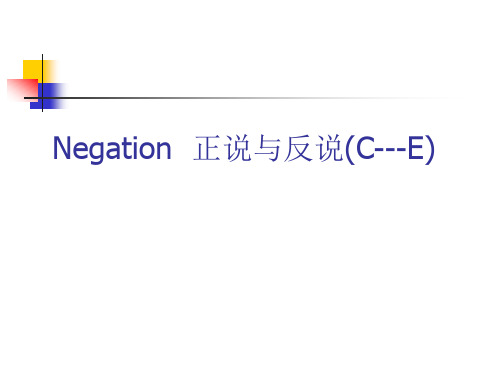
此句也可按反说译为: As the saying goes, “Men never weep unless
and until deeply hurt.”
5.如果没有他的帮助,我早就失败了。 Bபைடு நூலகம்t for his help, I should have failed.
我们决不辜负全国人民对我们的希望。 (反说;译文可正说)
We will live up to the expectations of our people.
他的解释不能让人满意。(反说;译文 可正说)
His explanation is far from satisfactory. 他虽然贫穷,但无论如何也不会说谎。
1.这次演出根本没有失败,而是十分成功。
2.他的作文中几乎没有语法错误。
3.据悉敌军给养不足。
4.我的拒绝显然使詹妮很不高兴,但作为一个理智 的女人,她没有跟我吵。
5.我们路经芝加哥时呆在一家收费不太高的旅馆里, 一夜只要40美元。
1.这次演出根本没有失败,而是十分成功。
The show was far from being a failure; it was a great success.
4.校长为人和蔼友善,但一涉及正经事,他 便对我们就事论事不讲感情,甚至会很严 厉。
The headmaster is a kind and friendly person, but when it comes to business he is matter of fact and can even be very hard on us.
英中翻译技巧
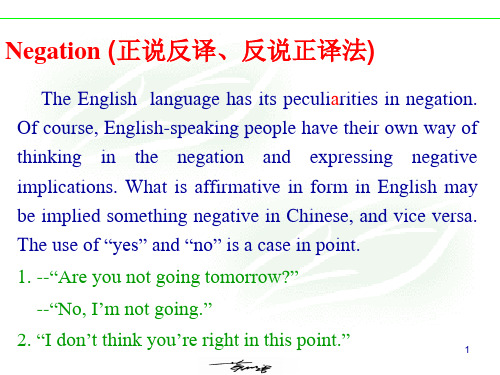
[<]
C. Affirmation--Negation 4 .That’s a thing that might happen to any man. 原译:这样的事情可能发生在任何人身上。
改译:这种事情谁也难免。
5. His speech leaves much to be desired.
他的讲话很不如人意。
多数情况下,因为原语重复,译语为了生 15 动或各自的惯用法,以不同的方式进行重 复。这种重复多为传达原文的生动性。
第五章:翻译技巧(下)——重译法
[<]
4). He no longer dreamed of storms, nor of great occurrenc es, nor of great fish, nor of fights.
原译:In the United States, everyone can buy a gun.
改译:In the United States, guns are available to everyone. 9. The darkness was thinning, but they were still in bed.
11
第五章:翻译技巧(下)——重译法
[<]
重复英语中作表语的名词
1). John is your friend as much as he is mine. 约翰既是你的朋友,又是我的朋友。 2). This has been our position –but not theirs. 这一直是我们的立场——而不是他们的立场。 3). He became an enterpriser—all by himself. 他成为一个企业家——一个白手起家的企业家。
- 1、下载文档前请自行甄别文档内容的完整性,平台不提供额外的编辑、内容补充、找答案等附加服务。
- 2、"仅部分预览"的文档,不可在线预览部分如存在完整性等问题,可反馈申请退款(可完整预览的文档不适用该条件!)。
- 3、如文档侵犯您的权益,请联系客服反馈,我们会尽快为您处理(人工客服工作时间:9:00-18:30)。
Translation concerning negationAims: to understand the features of Chinese and English as regards negation, the application of negation in the process of translationKey points: the application of negation in the process of translationDifficulties: affirmative 肯定in Chinese but negative in English, negative in Chinese but affirmative in EnglishTeaching procedures:Negation being an important conception in one’s expression of thoughts, expressions of negations is to be found in any tongue. This is naturally true of Chinese and English. However, the ways of indicating negation are quite different in the two languages. This frequently causes a lot of trouble to translators, who if not careful enough, would often make mistakes.1. Features of the two languages as regards negation●1. Both languages have negatives or expressions formed with negatives. In modern Chinese, the much-used negative words are: 不,没,别. These words express three different meanings: 不signifies表示denial of a statement;没denial of a being or occurrence(,非and 否can be put under this category);别dissuasion or prohibition(甭,勿,and 莫can be put under this category)●The oft-used negatives in English are “not”, and “no”, in addition to “nothing”, ”nobody” “none”, “without”, “ neither…nor”, “never”, etc.●Chinese negatives are generally capable of producing derivatives, particularly the word 不, 无and 非. Their derivatives are equivalent to English words formed by adding affixes, e.g. 不法unlawful, 不便inconvenient, 无边boundless,非正规军irregulars●In English, apart from using negatives to express negation, words with a negative sense can be formed by adding affixes to roo t words. The affixes thus used are mainly “less”suffix “un” “in”, and “non”●However, English words formed with affixes with a negative, while adjective and nouns formed with “un” such as “unavoidable” and “unbelief” are negative, for instance, verbs forme d with affixes such as “unclasp” and “uncork” affirmative.●In Chinese, words formed with negatives are generally negative in sense but in some cases they assume new meaning like 非常, which practically means 很.●In English, the same word formed with a different affix differs in meaning (compare discord with uncord). Sometimes, words formed with different affixes 词缀with a negative sense would produce words with different implications含义---derogatory贬义and the other non-derogatory褒义. For instance, immoral means 不道德,and is therefore derogatory while unmoral means 非道德,无道德观念的,and is therefore non derogatory. 1.W arm-up exercises2.I don't’ think Tom is correct.3.I don’t think Xiaoming is coming tomorrow.4.A re you not going tomorrow?---- No, I am not going .5.A frica is not kicking out W estern imperialism in order to invite other new masters.6.T he world today is far from peaceful.7.O ur PLA is worthy of being called a great army of the people.8.H e tried his best to overcome the lack of technical data.9.T he window refused to open.10.Y esterday he failed to get to school on time.11.They excluded children from getting in.12.The building is in a state of neglect.13.He is often absent- minded.14.To do this is beyond me.15.Lei Feng’s noble deeds are above all praise.16.I, rather than you , should do the work.17.The truth is quite other than what you think.18.She refrained from laughing.19.She was refused admitance by them.20.An opportunity is not likely to repeat itself.21.Live up to the expectations of our own people and the people throughout the world.22.Slips are scarely avoidable when you are new to your work.23.The meetings were marked by such an absence of lively discussions that at times they were almost on the piont of breaking up.24.Avoid operating the keys roughly.25.The scientists made a solemn plege at the conference, saying, “W e’ll forever live up to what our Party expecs of us.”26.The evidence is conclusive, excluding all possibilities of doubt.27.That fellow is far from being honest.28.Luan Ping stood still, trying vainly (in vain) to answer the battery of questions Y ang Zirong raised.29.That served to strenghen instead of weaken our determination.30.But for their help. W e should not succeeded in this experiment.31.All that glitters is not gold.32.All is not lost.33.All criminals are murderers.34.But aal men are born to reign.35.All that flatter you too much are not faithful friends.36.Both children are not clever.37.W e never thought of nothing wrong.我们从来没有想到有什么错误。
